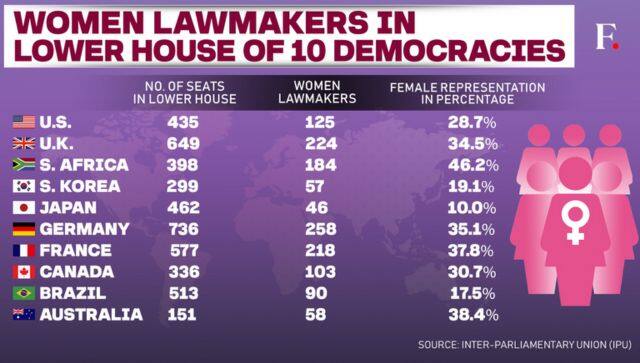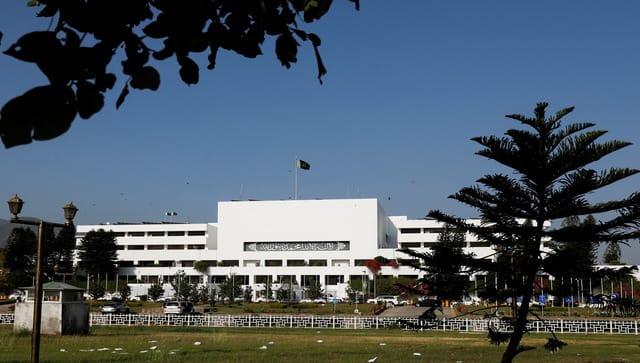A debate on the Women’s Reservation Bill is currently underway in the Lok Sabha. Congress MP Sonia Gandhi, who opened the debate for the Opposition, supported the Bill but demanded a sub-quota for Other Backward Classes (OBCs) in the proposed 33 per cent reservation of seats for women in the Lower House and all state Legislative Assemblies. She also pushed for implementing the Bill right away. The 128th Constitutional Amendment Bill, 2023, was introduced by Union minister Arjun Ram Meghwal in the Lok Sabha on Tuesday.
The long-pending Bill has been brought to Parliament multiple times, first introduced 27 years ago. However, due to deep divisions among political parties, the Bill failed to pass the final hurdle. There are many countries that have reservations for women in electoral politics to ensure greater participation and tackle gender disparity. Let’s take a closer look at how India fares among democratic nations. Which other countries have quotas for women in politics? Let’s take a closer look. How India fares India has a poor record among democracies, including the United States, and the United Kingdom, in terms of women’s representation in Parliament. According to Inter-Parliamentary Union (IPU) data, India is ranked 141 among 185 countries in terms of the percentage of women in the Lower House. Currently, India has 78 women MPs in the 545-member Lok Sabha, about 14 per cent of the total membership of the House. The majority of state Assemblies in India have less than 15 per cent women legislators.
The global average for women in Parliament is 26.7 per cent.
Rwanda has the highest number of women lawmakers globally, who occupy 49 of its 80 Lower House seats or about 61 per cent, as per the IPU data. At 46.2 per cent female representation in the Lower House, South Africa beats developed nations such as the US, the UK, Australia, Germany and South Korea in the percentage of women legislators. [caption id=“attachment_13147132” align=“alignnone” width=“640”] Note: The data for the US, Australia, France and Brazil is from last year, for Canada, Germany and Japan from 2021, for South Korea from 2019, and the UK, South Africa from 2019. Graphic: Nitish Rawat[/caption] Countries that have quotas for women In India, the 73rd and 74th amendments to the Constitution mandate all state governments to reserve one-third of the seats for women in Panchayati Raj Institutions and one-third of the offices of the chairperson at all levels of the Panchayati Raj Institutions, and in urban local bodies, respectively. However, a Bill reserving
33 per cent of seats for women in the Lok Sabha
and all state Legislative Assemblies is yet to get passed by both Houses of Parliament. While India has yet to have a quota for women at the national level, there are countries that provide reservations to women to enhance their participation in national and local politics. Pakistan After 2002, Pakistan reserved 60 of the 357 seats, or about 17 per cent, in the National Assembly for women. However, reservations for women existed in the country even before this. The Constitution of Pakistan of 1956 reserved ten seats for women in the then unicameral Parliament. Under the Constitution of Pakistan, 1962, six seats were reserved for women in the National Assembly, including three seats each from East and West Pakistan, as per a Business Standard report. The Constitution of 1973 reserved ten seats for women for ten years from the day of the implementation of the Constitution or holding the third general election, whichever happened later. In 1985, Pakistan increased the number of reserved seats for women from 10 to 20. This was further raised to 60 in 2002 under the then-Pervez Musharraf-led government, the report added. [caption id=“attachment_13146482” align=“alignnone” width=“640”]
Note: The data for the US, Australia, France and Brazil is from last year, for Canada, Germany and Japan from 2021, for South Korea from 2019, and the UK, South Africa from 2019. Graphic: Nitish Rawat[/caption] Countries that have quotas for women In India, the 73rd and 74th amendments to the Constitution mandate all state governments to reserve one-third of the seats for women in Panchayati Raj Institutions and one-third of the offices of the chairperson at all levels of the Panchayati Raj Institutions, and in urban local bodies, respectively. However, a Bill reserving
33 per cent of seats for women in the Lok Sabha
and all state Legislative Assemblies is yet to get passed by both Houses of Parliament. While India has yet to have a quota for women at the national level, there are countries that provide reservations to women to enhance their participation in national and local politics. Pakistan After 2002, Pakistan reserved 60 of the 357 seats, or about 17 per cent, in the National Assembly for women. However, reservations for women existed in the country even before this. The Constitution of Pakistan of 1956 reserved ten seats for women in the then unicameral Parliament. Under the Constitution of Pakistan, 1962, six seats were reserved for women in the National Assembly, including three seats each from East and West Pakistan, as per a Business Standard report. The Constitution of 1973 reserved ten seats for women for ten years from the day of the implementation of the Constitution or holding the third general election, whichever happened later. In 1985, Pakistan increased the number of reserved seats for women from 10 to 20. This was further raised to 60 in 2002 under the then-Pervez Musharraf-led government, the report added. [caption id=“attachment_13146482” align=“alignnone” width=“640”] Pakistan reserves 17 per cent of seats in the National Assembly for women. Reuters File Photo[/caption] However, the reservation policy has been mainly tokenistic in Pakistan. Although the quotas led to a higher number of female candidates being given tickets by political parties, they were mostly limited to reserved seats, meaning male candidates were more likely to be fielded from general seats, according to the Brookings Institution think tank’s 2019 report. As per the IPU data, about 20 per cent or 70 out of the 342 seats in the Lower House are currently occupied by women legislators in Pakistan. ALSO READ:
Women’s Reservation Bill: Why 33% quotas for women won’t be a reality until 2029
The Philippines The Philippines’ proposed Bill in the Congress calls for a 40 per cent gender quota in the decision-making structures of political parties and the number of candidates fielded by them. According to the Philippine Commission on Women, the country’s Parliament has 28 per cent women representation – higher than the global average. Out of the 311 seats in the Lower House, 85 are currently represented by women lawmakers, as per the IPU. At 29 per cent, The Philippines is also among the Southeast Asian countries with the highest rate of women’s representation in politics at the local level. Bangladesh In Bangladesh’s unicameral legislature, 50 out of 350 seats are reserved for women. The Jatiya Sangsad, the supreme legislative body of Bangladesh, currently has about 20 per cent female representation, i.e., 73 seats have women legislators. As per Business Standard, Bangladesh first introduced reservation for women in Parliament in 1972, reserving 15 seats for 10 years. As the reserved seats were increased to 30 in 1979 for the next 15 years, the total number of parliamentary seats climbed to 330. Through the 15th amendment to the Constitution in 2011, Bangladesh reserved 50 seats for women, taking the total tally of seats in the National Parliament to 350, the report noted. Other countries In the early 1990s, Nepal and Argentina set a minimum quota for women in the candidates’ list released by political parties. Interestingly, France, South Korea and Nepal have passed quotas for women as high as 50 per cent of the candidate list, as per the Brookings Institution report. “Countries like Argentina, Mexico and Costa Rica, have legislated party quotas and have over 36 per cent female representation in their national legislatures,” the think tank’s report noted. South Africa, Sweden and Germany have achieved higher female representation through voluntary quotas adopted by political parties. Other African nations such as Eritrea, Rwanda and Tanzania also have provisions for quotas for women in politics. With inputs from agencies
Pakistan reserves 17 per cent of seats in the National Assembly for women. Reuters File Photo[/caption] However, the reservation policy has been mainly tokenistic in Pakistan. Although the quotas led to a higher number of female candidates being given tickets by political parties, they were mostly limited to reserved seats, meaning male candidates were more likely to be fielded from general seats, according to the Brookings Institution think tank’s 2019 report. As per the IPU data, about 20 per cent or 70 out of the 342 seats in the Lower House are currently occupied by women legislators in Pakistan. ALSO READ:
Women’s Reservation Bill: Why 33% quotas for women won’t be a reality until 2029
The Philippines The Philippines’ proposed Bill in the Congress calls for a 40 per cent gender quota in the decision-making structures of political parties and the number of candidates fielded by them. According to the Philippine Commission on Women, the country’s Parliament has 28 per cent women representation – higher than the global average. Out of the 311 seats in the Lower House, 85 are currently represented by women lawmakers, as per the IPU. At 29 per cent, The Philippines is also among the Southeast Asian countries with the highest rate of women’s representation in politics at the local level. Bangladesh In Bangladesh’s unicameral legislature, 50 out of 350 seats are reserved for women. The Jatiya Sangsad, the supreme legislative body of Bangladesh, currently has about 20 per cent female representation, i.e., 73 seats have women legislators. As per Business Standard, Bangladesh first introduced reservation for women in Parliament in 1972, reserving 15 seats for 10 years. As the reserved seats were increased to 30 in 1979 for the next 15 years, the total number of parliamentary seats climbed to 330. Through the 15th amendment to the Constitution in 2011, Bangladesh reserved 50 seats for women, taking the total tally of seats in the National Parliament to 350, the report noted. Other countries In the early 1990s, Nepal and Argentina set a minimum quota for women in the candidates’ list released by political parties. Interestingly, France, South Korea and Nepal have passed quotas for women as high as 50 per cent of the candidate list, as per the Brookings Institution report. “Countries like Argentina, Mexico and Costa Rica, have legislated party quotas and have over 36 per cent female representation in their national legislatures,” the think tank’s report noted. South Africa, Sweden and Germany have achieved higher female representation through voluntary quotas adopted by political parties. Other African nations such as Eritrea, Rwanda and Tanzania also have provisions for quotas for women in politics. With inputs from agencies
)